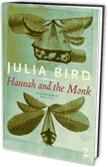
David Floyd on Catching the Cascade by Paul Lyalls (Waterways/Flipped Eye, 2009)
Paul Lyalls has probably been around on London’s poetry scene for longer than he can remember, let alone anyone else, but this is his first book.
Lyalls is best known as host of the Express Excess spoken word evenings at The Enterprise in Chalk Farm. Express Excess regulars will have heard some of these poems but not many of them as, observing the etiquette that the MC shouldn’t upstage his invited guests, Lyalls usually restricts performances of his own poetry at Express Excess to a few tried and tested crowd-pleasers.
Discovering Lyalls’ lesser-known work is one reason why Catching the Cascade is worth a look. Another is that he’s a true master of writing in a conversational style – so much so that in the poems that work best, you’re almost tempted to talk back.
Amongst the better-known performance hits, is ‘’Only In The Movies – no real confusion over what it’s about – a heavily gag-laden rhyming poem which, like much of Lyalls’ work, proves to be more than the sum of its gag:
All bombs are fitted with big red digital timers
that show you exactly when they are about to blow
and all bombs can only be defused
with three seconds to go.
(From 'Only In The Movies')
In ‘Fulla’, his poem about the first Muslim Barbie doll, Lyalls finds some unusual subject matter and a gently credulous angle to shed light on it:
Her makes claim
this isn’t just another Barbie doll.
Fulla is honest, loving and caring
And she respects her father and mother.
Just wait till she becomes a teenager.
(From 'Fulla')
There’s several poems about poetry and the people who produce it. The least positive but funniest is ‘Byronic Soul’, a send-up of the modern tortured poet:
I wandered lonely as a traffic warden
feel these tortured feelings
I’ve seen the best minds of my generation
destroyed at poetry readings.
Yeah, I’m tortured, I really burn,
I’ve suffered for my art
And now it’s your turn.
(from 'Byronic Soul)
Readers who don’t enjoy poems written in uncomplicated language, containing undisguised gags and the odd goofy rhyme probably shouldn’t bother this book but anyone likes that kind of thing done well should look no further.
* David Floyd's first full collection Protest will be published by Hearing Eye in June 2010.














